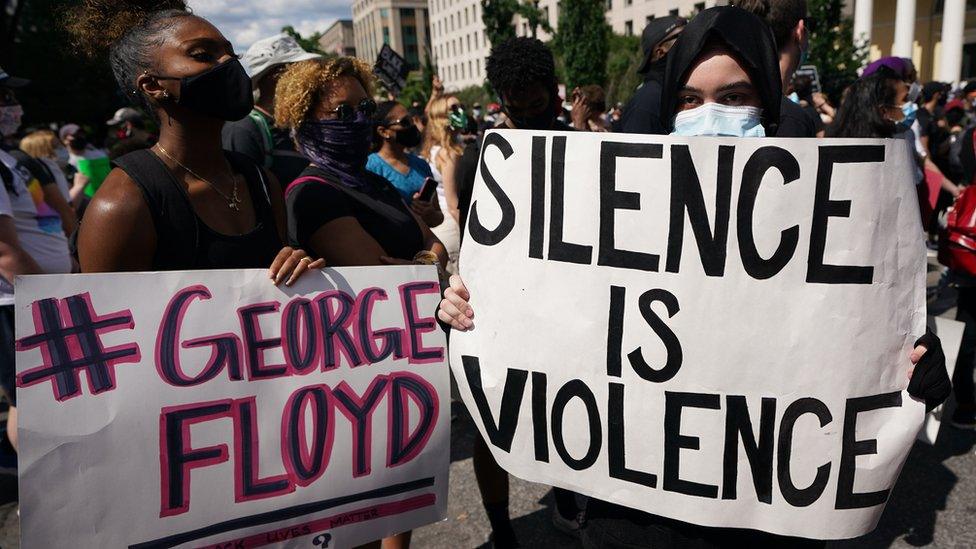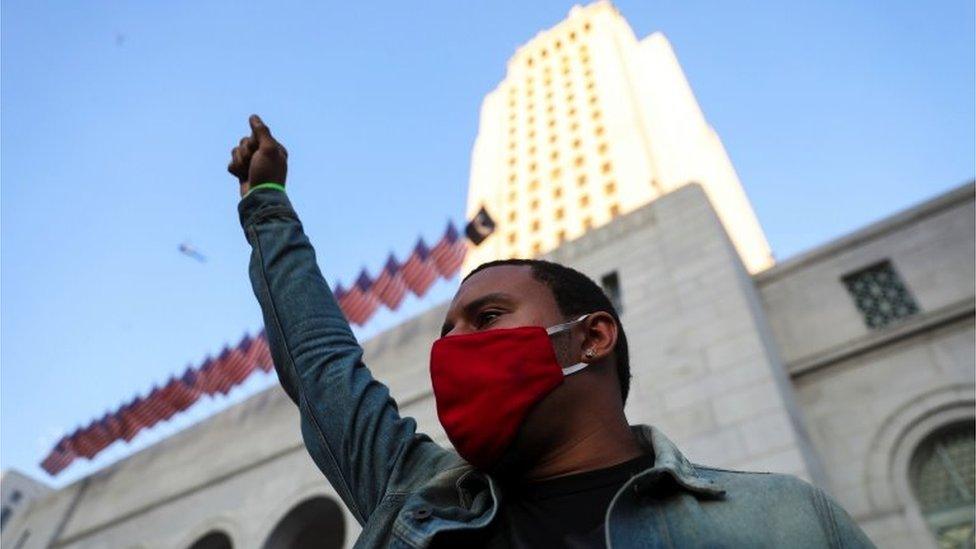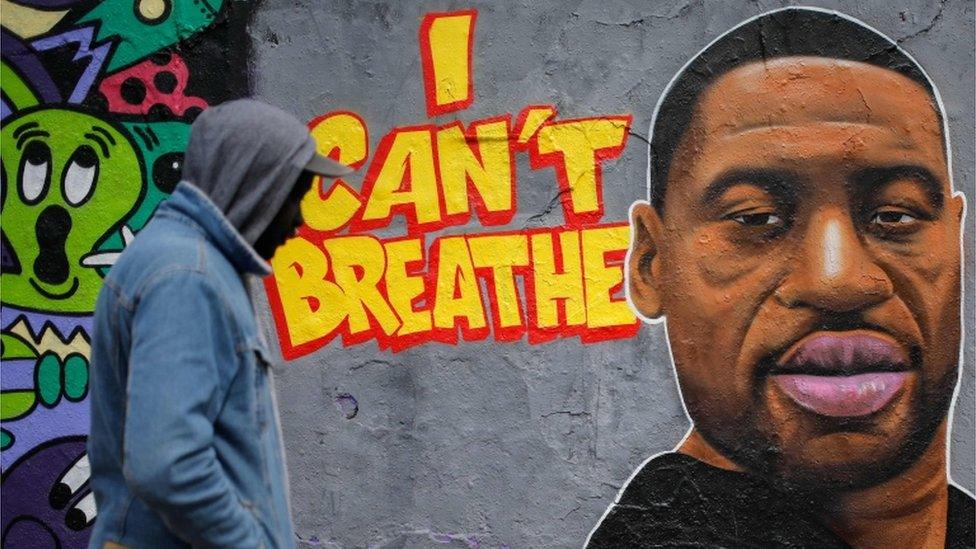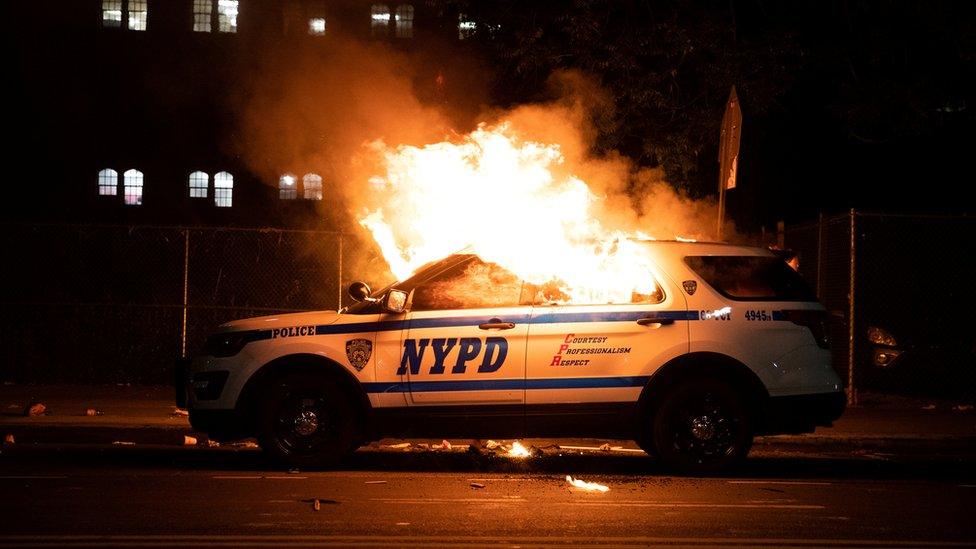George Floyd: Why are companies speaking up this time?
- Published

For years, black deaths in the hands of police have gone unremarked in corporate America. But this time, as protesters pour into streets across the country set off by the killing of George Floyd, businesses are speaking out.
Sportswear giant Nike was one of the first to leap into the fray with a social media post that twisted its "Just Do It" slogan to say: "For once, don't do it. Don't pretend there's not a problem in America".
"We stand in solidarity against racism and violence," YouTube posted a few hours later.
By 31 May, the internet was flooded.
"We see you and are with you" cosmetic brand Glossier posted to Twitter. "I am appalled," the head of investment giant BlackRock shared on LinkedIn. The chief of carmaker General Motors said she was "impatient and disgusted".
Even businesses hit by the looting that has occurred in the chaos of the demonstrations have stood firm.
"Property can be replaced, human lives cannot", fashion designer Marc Jacobs posted on Instagram.
Activists say the corporate outpouring is a welcome change from earlier eras.
"It is quite momentous," says Jade Magnus Ogunnaike, a deputy senior campaign director at Color of Change, a racial justice organisation founded in 2005. "There was a time five years ago when corporations... wouldn't say black lives matter for a billion dollars."
'Hollow and disingenuous'
The show of support has raised plenty of eyebrows - especially when the company in question has a chequered record when it comes to its own treatment of black employees.
L'Oreal's post saying "speaking out is worth it" drew a scathing response from British model Munroe Bergdorf, whom the beauty giant dropped from a campaign in 2017 after she wrote about white supremacy on social media.
"I am SO angry" the transgender activist wrote on Instagram. "Where was my support when I spoke out? I'm disgusted and writing this in floods of tears".
After the National Football League called for "action", filmmaker Ava DuVernay hit back that the statement was "beyond hollow + disingenuous", noting that the league just two years ago barred kneeling during the national anthem at games, after athlete Colin Kaepernick did so to protest against police brutality.
It later backed away from the policy. And on Friday, Commissioner Roger Goodell commented again.
"We, the NFL, admit we were wrong for not listening to NFL players earlier and encourage all to speak out and peacefully protest," he said.
What's driving the change?
The different tone is a sign that years of activism following deaths of black men such as Trayvon Martin and Philando Castile is paying off.
Recent polling by CBS, external found that 57% of Americans believe police are more likely to use deadly force against a black person than a white person, up from 43% in 2016.
While companies remain as reluctant as ever to wade into controversy, the scale of the demonstrations - which started in Minneapolis on 26 May and have since spread internationally - has made speaking up a "business imperative" says Dwayna Hayley, senior vice president at Porter Novelli, a communications firm that has advised companies such as McDonald's and Pepsi.
"What is driving this is the understanding that if we don't cater to the people that we serve, we could lose market share," she says. "It is a strategic business move."
Firms are also moving to preserve reputations among staff and potential recruits, says Brayden King, a professor at Northwestern University's Kellogg School of Management, who says internal work groups often play critical roles in getting corporate cultures to change.
As more and more companies come forward, it increases the danger of remaining silent, he adds.
"There are a lot of corporate leaders who are genuinely sympathetic. There's also a wariness of being on the wrong side of the issue and having their reputation damaged," he says.
"At this point there's more risk in not speaking out than in speaking out."
'Normal stuff'
In an effort to show there is action behind the statements, some firms, including Walmart, Disney, Facebook and Glossier, have pledged donations to black organisations, such as the NAACP or launched new diversity efforts.
Lego paused advertising for toys that feature police and the White House, while the co-founder of social media site Reddit resigned from its board, saying he should be replaced by a black candidate.
Allow X content?
This article contains content provided by X. We ask for your permission before anything is loaded, as they may be using cookies and other technologies. You may want to read X’s cookie policy, external and privacy policy, external before accepting. To view this content choose ‘accept and continue’.
Even with those commitments, most firms are still playing it safe, says Steve Callander, professor of management at Stanford Graduate School of Business.
Few executives have directly criticised the police or the White House, despite diverging markedly in tone with President Donald Trump, who has focused his remarks on ending the demonstrations. On social media, many of the posts even look the same, with white script on a black background.
"This is pretty much normal stuff," says Prof Callander, adding that the non-controversial nature of the support is likely to limit how much brand loyalty it will generate.
"What you're trying to do is create an authentic connection with your customer and your public and for that to be authentic it has to be costly," he says. "The big gain in speaking out on social issues is precisely because there's a downside."
'Beyond a statement'
Minneapolis voices: ‘As a black American I am terrified’
Ms Ogunnaike is now working on a campaign to push firms to back up their words with concrete actions.
She thinks a next step would be for companies to support funding cuts to police departments. This echoes the demands of many protesters, who have urged local governments to reduce spending on programmes that have supplied police with military equipment and other weapons.
Companies also need to improve pay and working conditions for black workers, who make up a disproportionate share of the low-wage workforce, she adds.
"We've never seen so many corporations make statements before," she says. "But what's most important as these protests continue is that corporations go beyond the statements."
- Published5 June 2020

- Published31 May 2020

- Published31 May 2020
